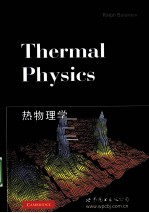图书介绍
热物理学 英文版2025|PDF|Epub|mobi|kindle电子书版本百度云盘下载

- (美)贝尔雷著 著
- 出版社: 世界图书北京出版公司
- ISBN:9787510024023
- 出版时间:2010
- 标注页数:442页
- 文件大小:23MB
- 文件页数:455页
- 主题词:热学-教材-英文
PDF下载
下载说明
热物理学 英文版PDF格式电子书版下载
下载的文件为RAR压缩包。需要使用解压软件进行解压得到PDF格式图书。建议使用BT下载工具Free Download Manager进行下载,简称FDM(免费,没有广告,支持多平台)。本站资源全部打包为BT种子。所以需要使用专业的BT下载软件进行下载。如BitComet qBittorrent uTorrent等BT下载工具。迅雷目前由于本站不是热门资源。不推荐使用!后期资源热门了。安装了迅雷也可以迅雷进行下载!
(文件页数 要大于 标注页数,上中下等多册电子书除外)
注意:本站所有压缩包均有解压码: 点击下载压缩包解压工具
图书目录
1 Background1
1.1 Heating and temperature1
1.2 Some dilute gas relationships4
1.3 The First Law of Thermodynamics8
1.4 Heat capacity11
1.5 An adiabatic process13
1.6 The meaning of words16
1.7 Essentials18
Further reading21
Problems21
2 The Second Law of Thermodynamics2.1 Multiplicity24
2.2 The Second Law of Thermodynamics28
2.3 The power of the Second Law29
2.4 Connecting multiplicity and energy transfer by heating31
2.5 Some examples35
2.6 Generalization39
2.7 Entropy and disorder44
2.8 Essentials45
Further reading46
Problems47
3 Entropy and Efficiency51
3.1 The most important thermodynamic cycle:the Carnot cycle51
3.2 Maximum efficiency55
3.3 A practical consequence59
3.4 Rapid change60
3.5 The simplified Otto cycle62
3.6 More about reversibility67
3.7 Essentials69
Further reading70
Problems71
4 Entropy in Quantum Theory75
4.1 The density of states75
4.2 The quantum version of multiplicity80
4.3 A general definition of temperature80
4.4 Essentials86
Problems87
5 The Canonical Probability Distribution5.1 Probabilities89
5.2 Probabilities when the temperature is fixed91
5.3 An example:spin 1/2h paramagnetism94
5.4 The partition function technique96
5.5 The energy range δE99
5.6 The ideal gas,treated semi-classically101
5.7 Theoretical threads109
5.8 Essentials109
Further reading111
Problems112
6 Photons and Phonons116
6.1 The big picture116
6.2 Electromagnetic waves and photons118
6.3 Radiative flux123
6.4 Entropy and evolution(optional)128
6.5 Sound waves and phonons130
6.6 Essentials139
Further reading141
Problems141
7 The Chemical Potential148
7.1 Discovering the chemical potential148
7.2 Minimum free energy155
7.3 A lemma for computing μ156
7.4 Adsorption157
7.5 Essentials160
Further reading161
Problems162
8 The Quantum Ideal Gas166
8.1 Coping with many particles all at once166
8.2 Occupation numbers168
8.3 Estimating the occupation numbers170
8.4 Limits:classical and semi-classical173
8.5 The nearly classical ideal gas(optional)175
8.6 Essentials178
Further reading179
Problems180
9 Fermions and Bosons at Low Temperature9.1 Fermions at low temperature182
9.2 Pauli paramagnetism(optional)192
9.3 White dwarf stars(optional)194
9.4 Bose-Einstein condensation:theory199
9.5 Bose-Einstein condensation:experiments205
9.6 A graphical comparison209
9.7 Essentials212
Further reading214
Problems215
10 The Free Energies222
10.1 Generalities about an open system222
10.2 Helmholtz free energy225
10.3 More on understanding the chemical potential226
10.4 Gibbs free energy230
10.5 The minimum property233
10.6 Why the phrase"free energy"?234
10.7 Miscellany236
10.8 Essentials238
Further reading239
Problems240
11 Chemical Equilibrium244
11.1 The kinetic view244
11.2 A consequence of minimum free energy246
11.3 The diatomic molecule250
11.4 Thermal ionization257
11.5 Another facet of chemical equilibrium260
11.6 Creation and annihilation262
11.7 Essentials264
Further reading266
Problems266
12 Phase Equilibrium270
12.1 Phase diagram270
12.2 Latent heat273
12.3 Conditions for coexistence276
12.4 Gibbs-Duhem relation279
12.5 Clausius-Clapeyron equation280
12.6 Cooling by adiabatic compression(optional)282
12.7 Gibbs'phase rule(optional)290
12.8 Isotherms291
12.9 Van der Waals equation of state293
12.10 Essentials300
Further reading301
Problems301
13 The Classical Limit306
13.1 Classical phase space306
13.2 The Maxwellian gas309
13.3 The equipartition theorem314
13.4 Heat capacity of diatomic molecules318
13.5 Essentials320
Further reading322
Problems322
14 Approaching Zero327
14.1 Entropy and probability327
14.2 Entropy in paramagnetism329
14.3 Cooling by adiabatic demagnetization331
14.4 The Third Law of Thermodynamics337
14.5 Some other consequences of the Third Law341
14.6 Negative absolute temperatures343
14.7 Temperature recapitulated347
14.8 Why heating increases the entropy.Or does it?349
14.9 Essentials351
Further reading352
Problems353
15 Transport Processes356
15.1 Mean free path356
15.2 Random walk360
15.3 Momentum transport:viscosity362
15.4 Pipe flow366
15.5 Energy transport:thermal conduction367
15.6 Time-dependent thermal conduction369
15.7 Thermal evolution:an example372
15.8 Refinements375
15.9 Essentials377
Further reading378
Problems378
16 Critical Phenomena382
16.1 Experiments382
16.2 Critical exponents388
16.3 Ising model389
16.4 Mearn field theory392
16.5 Renormalization group397
16.6 First-order versus continuous407
16.7 Universality409
16.8 Essentials414
Further reading415
Problems415
Epilogue419
Appendix A Physical and Mathematical Data420
Appendix B Examples of Estimating Occupation Numbers426
Appendix C The Framework of Probability Theory428
Appendix D Qualitative Perspectives on the van der Waals Equation435
Index438
热门推荐
- 1421819.html
- 2685408.html
- 2007031.html
- 2140066.html
- 1788976.html
- 1355171.html
- 294490.html
- 2270253.html
- 62122.html
- 2493275.html
- http://www.ickdjs.cc/book_174981.html
- http://www.ickdjs.cc/book_1922194.html
- http://www.ickdjs.cc/book_1809884.html
- http://www.ickdjs.cc/book_1135464.html
- http://www.ickdjs.cc/book_250935.html
- http://www.ickdjs.cc/book_3453516.html
- http://www.ickdjs.cc/book_114224.html
- http://www.ickdjs.cc/book_1270734.html
- http://www.ickdjs.cc/book_774185.html
- http://www.ickdjs.cc/book_2298676.html